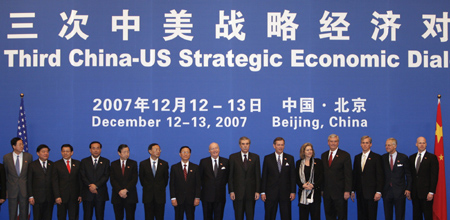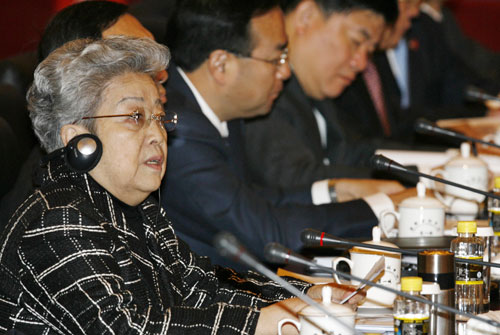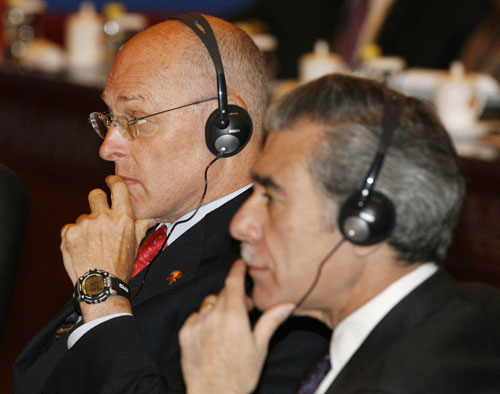Chinese Vice Premier Wu Yi advocated dialogue and consultation as the only way to settle economic and trade disputes at China-U.S. high-level economic talks which opened Wednesday.
Chinese and United States officials pose for group picture during the opening of The Third Strategic Economic Dialogue in Xianghe, near Beijing, December 12, 2007. [Agencies]
Speaking at the opening ceremony of the bilateral Strategic Economic Dialogue, she recognized that the strong growth of China-U.S. business ties has boosted their cooperation in other fields and has become a foundation for the overall China-U.S. relations.
Chinese Vice-Premier Wu Yi gives an opening statement during the opening of The Third Strategic Economic Dialogue in Xianghe, near Beijing, December 12, 2007. [Agencies]
US Treasury Secretary Henry Paulson and Secretary of Commerce Carlos Gutierrez (R) listen to Chinese Vice-Premier Wu Yi (not shown) during the opening of The Third Strategic Economic Dialogue in Xianghe, near Beijing December 12, 2007. [Agencies]
"History has repeatedly shown it is dialogue and consultation, not confrontation and finger pointing, that has enabled the China-U.S. business relations to grow."
Bilateral trade volume is expected to top 300 billion U.S. dollars this year, said Wu, adding that the two countries are each other's second largest trading partners and that China has been the fastest growing export market for the U.S. for five years in a row.
"We should address issues in our business relations in a constructive way," said Wu, who believes that the talks will help boost China-U.S. business ties and constructive and cooperative relations.
The two-day high-level talks will focus on down-to-earth issues from trade integrity, product safety, balanced economic development to energy and environmental cooperation.
"These issues are those of concern to both countries and demonstrate our shared desire to resolve difficulties and problems in the rapid growth of bilateral business ties," she said.
But Wu warned that "We oppose attempts to politicize trade issues", which will harm the interests of both sides.
"I am particularly concerned about the 50 protectionist China-related bills introduced in the U.S. Congress," she said. "I must candidly tell Secretary Paulson that these bills, if adopted, will severely undermine U.S. business ties with China."
Wu appealed the U.S. government, Congress and media to heed the voice of the U.S. business community which claimed in a joint letter to the Congress in September that trade sanctions against China would "only cause a negative impact".
The vice premier also reiterated that China, whose policy is to maintain a basic balance in international payments, has no intention to seek large trade surplus with the U.S.
"I once again call on the U.S. to relax its export control over hi-tech products for civilian use in China," she said. This is in the interest of the U.S. because it will help expand its market share in China, she added.
"Our policy is clear. China's door is wide open to American products and the key is what policy the U.S. should pursue."
Chinese exports in October jumped 22.3 percent to 107.7 billion U.S. dollars over the same month last year, pushing its monthly surplus to a record 27 billion U.S. dollars.
The allegedly undervalued Chinese currency, the yuan, gives China's exporters an unfair advantage and is a main reason for the massive trade imbalance between China and the U.S., according to U.S. critics.
(Xinhua News Agency December 12, 2007)





